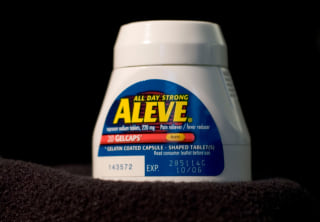 Federal health officials say the pain reliever in Aleve may be safer on the heart than other popular anti-inflammatory drugs taken by millions of Americans.
Federal health officials say the pain reliever in Aleve may be safer on the heart than other popular anti-inflammatory drugs taken by millions of Americans.
A Food and Drug Administration review posted online Tuesday said naproxen — the key ingredient in Aleve and dozens of other generic pain pills — may have a lower risk of heart attack and stroke than rival medications like ibuprofen, sold as Advil and Motrin. FDA staffers recommend relabeling naproxen to emphasize its safety.
The safety review was prompted by a huge analysis published last year that looked at 350,000 patients taking various pain relievers. The findings suggest naproxen does not carry the same heart risks as other medications in the class known as nonsteroidal anti-inflammatory drugs, or NSAIDs.
The agency released its memo ahead of a public meeting next month where outside experts will discuss the new data and whether naproxen should be relabeled. The agency is not required to follow the group’s advice, though it often does.
If ultimately implemented, the labeling changes could reshape the multibillion-dollar market for drugs used to treat headaches, muscle pain and arthritis.
The change could make Aleve and other naproxen drugs the first choice for patients with a higher risk for heart problems, according to Ira Loss, a pharmaceutical analyst with Washington Analysis. But he added that all NSAIDs will continue to carry warnings about internal bleeding and ulceration, a serious side effect that is blamed for more than 200,000 hospital visits every year.
Source: nbc news


